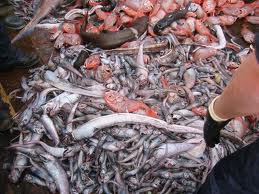Have you
ever stopped to really think about the food on your plate, where it comes from
and how it impacts our world? Recently I read a book called “Eating Animals” by
Jonathan Safran Foer and, although I read many books on the subject, this book
spoke to me more than any others.
I love the
tone and the stories around the main subject; even if I often question myself
about my eating habits this book opened up new avenues of questioning.
I would
like to start a world revolution about our relationship with food, awaken a consciousness
about the legitimacy of man’s supremacy over the animal world.
 It is said
that we can not stop progress however; I wish we could use it wisely. I don’t
think that using technology for fisheries and depleting our oceans are wise choices. Did you know that the fishing of the precious tuna that
everyone loves so much is responsible for the killing of 145 species of sea
creatures? And, that for every shrimp fished out there are twenty-six pounds of
sea creatures killed as by catch? Check this link about the Seafood Crisis: http://ngm.nationalgeographic.com/2010/10/seafood-crisis/greenberg-text
It is said
that we can not stop progress however; I wish we could use it wisely. I don’t
think that using technology for fisheries and depleting our oceans are wise choices. Did you know that the fishing of the precious tuna that
everyone loves so much is responsible for the killing of 145 species of sea
creatures? And, that for every shrimp fished out there are twenty-six pounds of
sea creatures killed as by catch? Check this link about the Seafood Crisis: http://ngm.nationalgeographic.com/2010/10/seafood-crisis/greenberg-text
Over-fishing is dangerous for all of us, it endangers the balance of the oceans. What will we do once all the fishes are gone? http://ocean.nationalgeographic.com/ocean/photos/oceans-overfishing/
As I walked
through the aisles of supermarkets, I can not help wondering if we really need
this much food and varieties. Yes, yes…variety is the spice of life! But, isn’t
also its death? It really boils down to the choices we make, I am certain that
most of our kitchens are packed with things that will either sit on the shelves
or be thrown away. I am ashamed to say that I am guilty of this myself.
I am not
preaching vegetarianism but I am starting to understand that we can make better
choices. If we all started to choose our food wisely, we as a people could have
a positive impact on how the food industry manages its resources. For example,
we could cut down our meat and fish intake, and when we want meat or fish, we
buy it from biological, organic or family farms, and we buy local as much as
possible, I grant you it is a bit more expensive but it has its advantages, it
is better for us and the planet. I believe this will also bring consciousness
to the dinner table and a sense of pride knowing that even in a small way you
are contributing to helping the planet and all its inhabitants.Check this article about factory farming: http://newswatch.nationalgeographic.com/2011/10/13/factory-farming-is-not-the-best-we-have-to-offer/
Let’s face
it we all know the cruelty animals face in this big corporate food market,
unfortunately, we choose to ignore it. So, I am challenging everyone to make
changes and raise their awareness. Be aware of what is served on your plate and be grateful
for each bite you take.
We have to send a message to the fishing industries that
they have to be more responsible in their way of operating. Collateral damage
is unacceptable; the killing of tons of sea creatures during fishing
expeditions has to stop.
Always
remember that "WE" as consumers have power, power by the choices we make and
actions we take.



